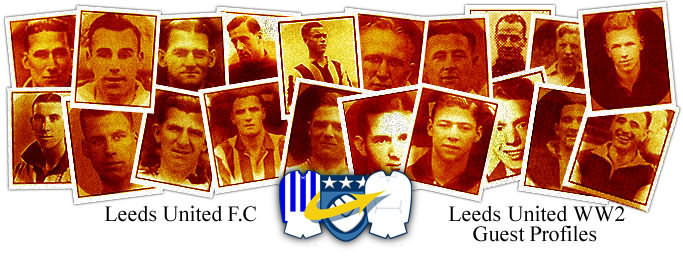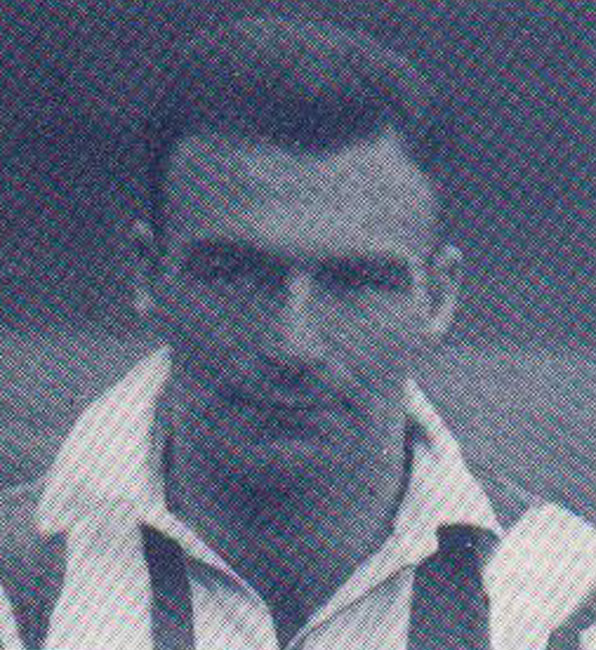

Simpson: John
WW2 Guest: 1942-1943
(Leeds United War-time Guest Player Details)
Full Back
Born: Hedon, East Yorkshire: 27-10-1918
Debut: v Bradford Park Avenue (h): 07-11-1942
Height & Weight: Unknown
Simpson played for Hull City Boys and started his football career with Beverley White Star
and Bridlington Trinity before he joined Third Division North Hull City in 1937 as an amateur.
Although he made several appearances for the Reserves, he never played a senior game for the
Tigers before moving to First Division Huddersfield Town in March 1939, where he had trials
before signing professional forms at the age of eighteen. His wages were £4 per week and this
would increase to £5 if he made the first team and he would also receive a £2 bonus for a win!
He did not play any senior games for the Terriers before the outbreak of World War Two. During
World War Two he was in the Army Physical Training Corps, was captain of the Southern Command
Team and guested with several clubs. It was during this time that he played with or against
all the top players of the day including Stanley Matthews, Tom Finney, Raich Carter, Peter
Doherty, Wilf Mannion, Joe Mercer and Matt Busby. He played one game for Aldershot in the
1940-41 season and two in the 1941-42 season. He also played four games for Bournemouth in
1941-42, returning in 1945-46 to play a further twelve times. He did make his debut for
Huddersfield Town in his only game for them in the 1942-43 season and that was in front of a
60,000 crowd at Maine Road, Manchester, when Huddersfield held the Sky Blues to a 1-1 draw on
26th April 1943. He did not return to play for Huddersfield until the 1945-46 season, when he
made seventeen appearances. He guested with Leeds United in the 1942-43 Football League
Northern Section (First Championship). He only played two games and made his debut at Left
Back in a 1-1 draw with Bradford Park Avenue at Elland Road on 7th November 1942 and played at
Right Back in the reverse fixture as United lost 0-1 at Park Avenue. He also had one game with
Clapton Orient in the 1943-44 season. He returned to Huddersfield Town after the war and made
two F.A. Cup appearances in 1945-46 in addition to the War-time League games. He lined up, at
left-back, the position he would occupy throughout his career, in Huddersfield’s first
peace-time League match in the First Division on 31st August 1946 in a 1-3 home defeat by
Blackpool. He made just five League appearances that season and in March 1948 he was transferred
to York City for the sum of £1,000, a York club record, at the time. Although he was almost
thirty at the time of joining York his career had hardly begun. However, he gave tremendous
service to the club over the seven seasons that he spent with them as a player. He was a hard
tackling, no-nonsense defender whose speed and fitness held him in good stead in his mastery of
opposing right-wingers. He made his York City debut on 13th March 1948 in a 3-3 home draw with
Southport in the Third Division North, and although he went on to play two hundred and seven
League and thirteen F.A. Cup games in less than seven seasons, his name never appeared on the
scoresheet. A kick in the eye which caused a detached retina was the injury that forced his
retirement in 1954. After setting up a fruit and vegetable shop in Hull, he was quickly lured
back into football when he joined Hull City as a coach/physiotherapist and stayed in that
capacity for nine years during which time the club gained promotion to Division Two in 1959. He
remained with Hull until 1963 before he moved on to Hartlepool United, initially as a coach,
and in 1969 the club won promotion, and then he succeeded Gus McLean as Manager. The following
season the club were knocked out of the F.A. Cup by non-League Rhyl and after a run of bad
results he left in March 1971. He was not out of the game for long and he became
coach/physiotherapist at Cambridge United in 1971 and helped them to two promotions in 1973 and
1977. During this period he also helped to prepare the Cambridge University side in their
annual match against Oxford University, then played at Wembley. He left Cambridge in the summer
of 1977 to return to his roots and became physio/trainer at York City, where he had served so
well as a player. His wife Dorothy also helped at the club preparing tea and looking after the
player’s laundry. He retired at the age of sixty-five in October 1983 after receiving a
well-earned testimonial match against Leeds United on 9th May 1983. He died in Market Weighton
on 21st June 2000.